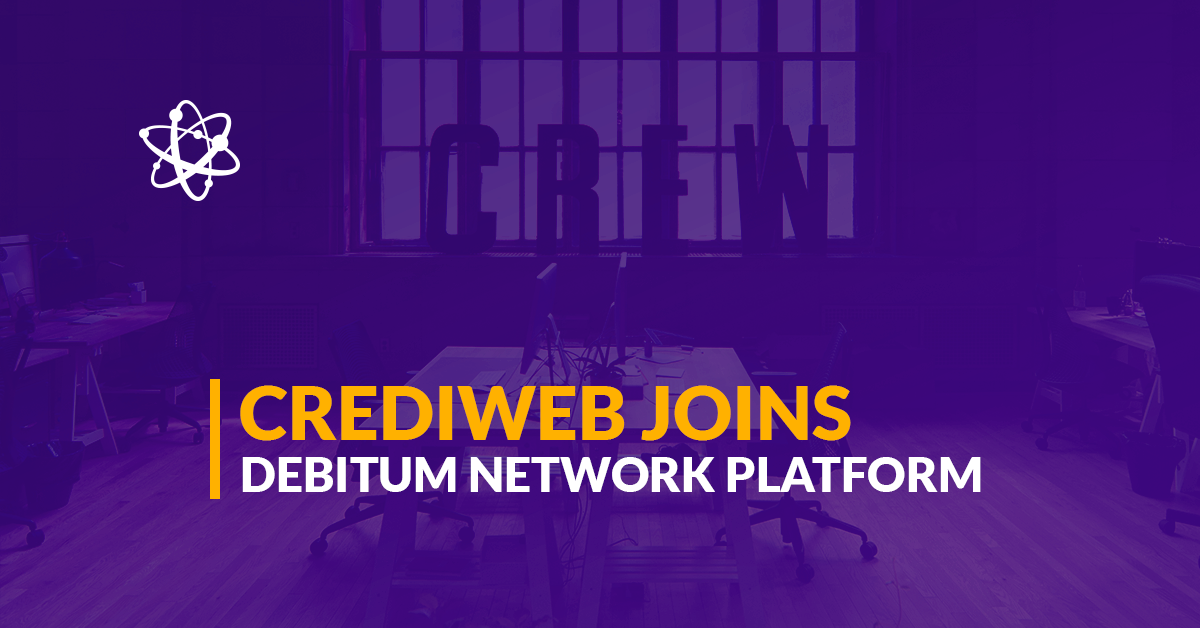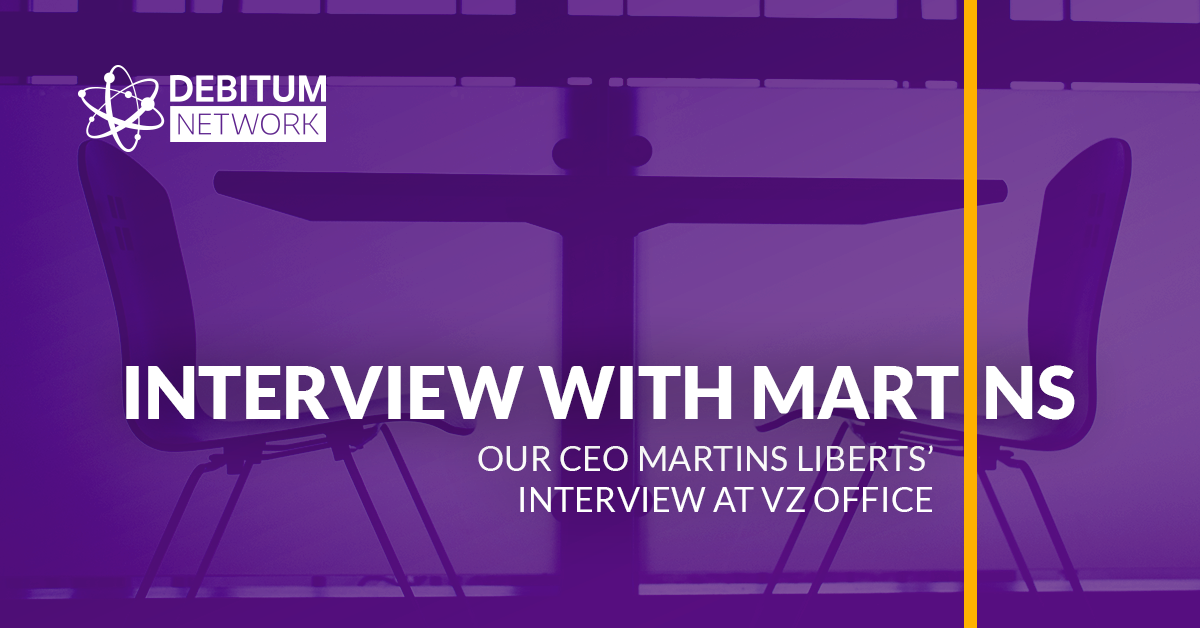Tag: financing of SMEs
Risk rating company CrediWeb joins Debitum Network platform

Risk rating company CrediWeb joins Debitum Network platform
It is great to announce the expansion of our network. We are very excited as a new credit rating company CrediWeb from Latvia has joined Debitum Network platform. This is the second credit risk rating agency cooperating with us to provide accurate risk rating for business loans uploaded on the platform. We believe this partnership will help us provide our users with an even better product. From now on, CrediWeb will provide a risk rating for assets from Latvian loan originators.
Debitum Network aims to be a decentralized marketplace connecting additional parties in the lending process. With the expansion of our platform to other markets within the EU, we expect to onboard a lot more counterparties to facilitate the process. CrediWeb is a valuable partner that has extensive experience in risk rating and will help us to deliver a more qualitative lending service by providing a more precise credit risk assessment for the assets uploaded on our platform.
About CrediWeb
CrediWeb, in cooperation with licenced re-user SIA Crefo Rating, provides online access to information from the Register of Enterprises of the Republic of Latvia, providing clients with the most actual information and changes, which are updated along with changes registered in the Register of Enterprises.
CrefoScore for risk rating
Latvian largest companies trust and use CrediWeb solvency index CrefoScore to assess the financial position of potential or existing business partners or clients. Index accurately and clearly shows the probability of default. CrefoScore is their unique solvency rating and one of the most important components of the report – showing the probability, at which the company will be unable to pay its debts in the next 12 months. CrefoScore is calculated on a daily basis for every Latvian company, taking into account various factors, such as financial data, credit history, and other economic and financial components.
We understand the importance of versatility and, therefore, we are working to bring in more partners on our platform: loan originators, risk assessors, and debt collectors. Partnership with CrediWeb brings us closer to an effective financing ecosystem for the financing of SMEs. Stay tuned for more upcoming updates!
Ready to invest in low-risk loans for SMEs?
Disclaimer: Investments in financial products are subject to market risk and any investment should only be done with risk capital. The above references an opinion and is for information purposes only. It is not intended to be investment advice. Seek a duly licensed professional for investment advice.
Recap of Debitum Network VIP Access Event

Recap of Debitum Network VIP Access Event
 On the 23rd of August, Debitum Network organized a testing event in Blockchain Vilnius premises and presented a demo version of the long-awaited platform, that is due to be released on the 3rd of September. Co-founder and visionary of Debitum Network Martins Liberts gave a short speech to VIP attendees, presented some of the features of the platform, answered questions and the event finished with a panel discussion. Guests were able to try the demo version of the platform after the event.
On the 23rd of August, Debitum Network organized a testing event in Blockchain Vilnius premises and presented a demo version of the long-awaited platform, that is due to be released on the 3rd of September. Co-founder and visionary of Debitum Network Martins Liberts gave a short speech to VIP attendees, presented some of the features of the platform, answered questions and the event finished with a panel discussion. Guests were able to try the demo version of the platform after the event.
Why Debitum Network?
Martins Liberts started his speech by stressing the importance of a small business owner to stay in control and not be forced to sell his business due to lack of available capital. Debitum Network was created with the intention that nobody will have to go through the ordeal and all SME owners could keep their businesses and run them as they believe they should.
Martins shared about tough decisions that he and Donatas, being co-founders of high tech company had to sell some share of their company, because they had run out of capital and could not move forward due to lack of funds. M. Liberts expressed his wish that no entrepreneur had to find himself in such a situation and admitted that he and Donatas got lucky and a few years later were able to buy the company back. The experience changed them forever.
The second thing that Martins pointed out as crucially important for the creation of Debitum Network was the need to move fast into the market and be there with the customers rather than concentrate too much on the back end of business.
Martins gave an example: “The three co-founders (Martins, Donatas and Justas) learned the lesson with Debifo – alternative financing company. Having collected 500 000 EUR, we immediately started distributing loans to businesses. Our competitors were concentrating on back-end processes and as time passed by and Debifo reached 1 million Euros portfolio in loans, most of our competitors had already gone out of business, because they were too much focused on back-end solutions and were not moving forward fast enough”.
The gap for underfinanced SMEs has increased
Debitum Network project started one and a half years ago. At that time, the gap for underfinanced small businesses around the world was 2.6 trillion $. Since that time, the gap has actually expanded to 5.2 trillion $. Martins stated, that the fact proved the need for such companies as Debitum Network. The numbers, similarly, prove that the current financing system does not work and that’s why Debitum Network is necessary for remodeling of the process.
The steps for remodeling the financing process
“The first step is that of decentralization, where financing process is no longer a two-party game (borrower and lender). In the financing process, borrowers most likely are local, while the lenders tend to be global. There is already a disparity here. There are necessary various steps in the financing process that will involve third parties: risk assessment, guarantee, insurance or debt collection, who would be local companies. So, there should be created an ecosystem for the financing to function smoothly”, Martins elaborated.
Trust element in lending is of uttermost important and it is the second step. Lenders are putting the money out and trust is important for them. They need an ecosystem that they will be able to trust. Debitum Network is collaborating with KTU (Kaunas Technical University) to create a trust rating algorithm for participants. Each of them will have an initial trust rating and as they move on, they will acquire activity-based trust rating.
The third step for improving the financing process is blockchain. Transparency, security, and trust are some of the features that blockchain is bringing into businesses and enables to implement some of the ideas that Debitum Network stands for.
Presentation of platform demo version
Having gone through brief history and the steps Martins showed to the audience what the platform will be like: investing in assets, filtering assets in categories, building a briefcase, selecting industries to invest in, key features and functionalities, and how easy it is to use the platform.
Our technical team has done a great work during the six months of development. Having looked at Martins presentation, you will be convinced that we have accomplished far more than we had initially anticipated.
After the presentation, Martins shared his expectations and plans for the platform, as well as business expansion, and took time to answer general questions from the participants of the event.
Panel discussion
After Martins finished answering the questions, Debitum Network CMO Mantas Povelauskas invited a few guests for a panel discussion. The participants were: Linas Armalys from Credital (alternative business finance company and a business partner of Debitum Network), Artur Geisari from Monify and Elijus Civilis, the vice minister of the Ministry of Economy of the Republic of Lithuania.
The vice minister clearly stressed that: “The backbone of any economy of any country is small and medium-sized businesses and such services as Debitum Network are necessary because most of the current lending institutions fail to meet ongoing capital needs of small businesses”. He, similarly, recommended alternative lenders to concentrate on specific sectors, learn about prospective customers and provide the best service possible by making the product as easily understandable and accessible as one can make.
“The demand for SMEs in Lithuania remains topical and businesses do approach alternative financing companies to get loans. On the other hand, traditional banks neglect the sector as it seems too small for them”, were Linas Armalys’ thoughts.
According to Monify, the credit gap for small businesses may be well beyond 5 trillion $. Artur G, likewise, elaborated that the company sees more and more business applications for loans in Lithuania, Latvia, Estonia, and Poland.
At the end of panel, Martins Liberts, again, singled out differences between various markets, even those that appear to be close to each other, like Lithuania and Poland. “Small businesses in Lithuania tend to pay loans on time and do not need prolonged grace periods. On the other hand, business owners in Poland tend to be late as they see being on time as a sign of weakness, and that is sort of a culturally ingrained thing now in Poland” concluded Martins.
Guests test the platform
With the end of the panel discussion, Mantas invited everybody to test Debitum Network demo product at workstations to get a feel how it works, how to invest, see what functionalities are there and maybe ask Martins or technical team any extra questions privately. Below are some photos from the event. For more, visit our Facebook page: https://www.facebook.com/DebitumNetwork
[envira-gallery id=”1292″]
Martins Liberts’ interview at VZ office

Martins Liberts’ interview at VZ office
VZ (Verslo Zinios), one of the leading business/finance newspapers in Lithuania invited co-founder of Debitum Network Martins Liberts for an interview. Martins sat down to share his vision of Debitum Network, behind the scenes of preparation for the upcoming release of the platform on the 3rd of September, and future plans. Below are some of the themes that were covered during the interview.
“Banks are not necessary for borrowing”
The title of the article “The banks are not necessary for borrowing” put a smile on our faces. IFC (International Finance Organization) has recently released a report, which indicates that there is 5.2 trillion $ gap in credit for micro, small and mid-sized businesses in the world. Traditional banks are not that interested in financing these. Debitum Network aims at filling some part of the gap by connecting small businesses in need of capital with investors. As a result, a new market is being created, where Debitum Network will connect borrowers to investors who invest in fiat. Thus, banks will also be able to participate in the financing process.
Debitum Network is a B2B platform
Martins singled out that in Lithuania and around the world there are a lot of internet lending platforms that are P2P (peer to peer), while Debitum Network is B2B (business to business). The main focus is to connect businesses that want to borrow with businesses that want to invest.
Individual investors will also have a chance to onboard the platform and invest flexible amounts, but the recipients of loans will only be businesses, not individuals. At the beginning of September, Debitum Network is organizing a fundraising event in London, where more than 100 institutional investors are expected to participate.
Investment amounts and potential interest
Most P2P platforms lend at 20% or more annual interest rates and few if any businesses will borrow under such conditions. When Debitum Network platform launches, SMEs will be able to borrow up to 10 million EUR, at an average 10-15% interest rates annually with terms between 2 weeks to 2 years. Banks typically lend at 3-8%, so you may see that we fit in the golden middle.
Responsible assessment of SME and distribution of loans
Martins, likewise, stressed that loans will be distributed responsibly and each SME that applies for a loan will have to provide legal documents, prove its’ solvency and pledge some assets as a guarantee.
Blockchain technology will be key to test the reliability of a borrower, as all operations and will be recorded on the blockchain and will be available to everybody.
Trust rating algorithm, together with a risk assessment score give star ratings for each participant on the platform. Trust rating algorithm was created by KTU (Kaunas Technological University). Third parties will also offer services of risk assessment, insurance, and debt collection.
Expectations for the launch
Martins states, that it is expected to start with € 500 000 – 1 000 000 worth of loans, on the day of the launch and have a turnover of 10 million EUR by the end of the year. Debitum Network has already made agreements with enterprises from Lithuania and Latvia and will soon be joined by companies from Estonia. The Czech Republic and other European countries will follow suit.
Modification to the previous expansion plan
Liberts admitted, that initial plan to launch in 16 countries and later expand to 50 countries were too ambitious, and the plan was moderated to expand at a slower pace, but in a more decisive manner and convincingly, by starting in 5 markets.
In the beginning, the funds between investors and SMEs will run through Debitum Network, and as the system reach maturity, Debitum Network will perform the function of a “bulletin board” by simply connecting investors with businesses who need to borrow.
The co-founders and experience beyond Debitum Network
Besides Martins Liberts, the other two co-founders of Debitum Network are Donatas Juodelis and Justas Saltinis, both of them are also co-founders of invoice financing company “Debifo”. Donatas is also one of the co-founders of INNTEC – a progressive IT company.
Thus, Debitum Network is being built on the practice and experience gained in the sectors of finance and technology. The company currently has around 30 people working on the project.
